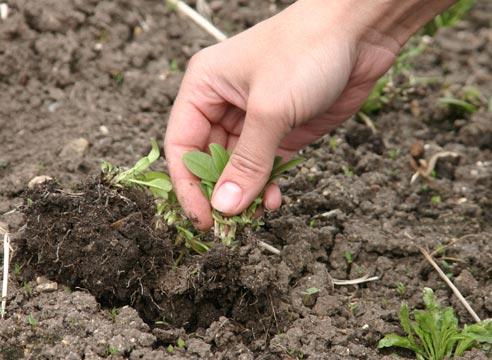Unexpectedly, the meager harvest can not do not disappear. Immediately a caring owner will begin to seek the causes of what happened. "Probably, not enough bait was made, and maybe the pests are to blame," he will most likely think. Do not hurry with the conclusion, suddenly the earth is just tired? In this article we will talk about the soil and well-known ways to combat this.
Content
Why is the soil tired?
Nothing in our world is eternally - everything has the property to end, break, wear out. Exactly the same situation happens with the soil. The young plant pulls out all minerals from the ground, and there are no bottomless stock there. Do not forget about weeds: these pest plants also pull out all juices. As a result, the soil is depleted - the long-awaited rich harvest is just nowhere.
Soil is an ideal place for breeding microorganisms. The pests from the detachment of insects are becoming there. All this does not contribute to an increase in fertility on the site. According to scientists, the processes of rotting leaves, broken branches of fruits contribute to "fatigue". The most sensitive to soil is a garden strawberry, the least - gooseberry, black and red currant.
Allelopathy plants and soiling - methods of struggle
Sometimes plants do not get along with each other. Putting them next, do not expect anything good, because with time, one will begin to suppress the development of others. Such interaction can be positive, but most often on the contrary. For example, if you plan the beans near the corn, then the bean culture will try to impede the growth of the neighbor. At the same time, there is a positive moment - such corn will be rich in the protein.
Another mistake of the hosts - from year to year to plant the same culture in the same place. Experiment in the garden is similar to redevelopment in the apartment: it is useful, but the mass of worries is involved.
How to deal with soil
Screwing the Earth and regular fertilizers - effective ways. You should not forget about them, but if the soil is really tired or, even worse, almost ceased to be fruit, then the usual resistance of the earth will not help. In this case, it's time to resort to radical actions.
The ideal option is crop rotation. If you hear it for the first time, then do not be afraid - it is in mind the usual seasonal alternation of cultures. Related plants - bad predecessors for each other. Consider on the example:
- where the beet grew and tomatoes grew, not a place to grow cabbage, which you can not say about carrots, cucumbers;
- Bow is better to plant at the site of harvesting garlic, radish, carrots, but a pumpkin and watermelon is not an option;
- currant will not want to bloom in the place where there was a gooseberry, but with joyful wipe the place belonging to the strawberry, strawberries;
- cucumbers plan the place where the onions, cabbage, beets have previously dwell.
Prevention
1. Screwing the soil after harvest. Take a note on the regular procedure of soil loosening.
2. Do not forget about organic fertilizers. Plants stretch from the ground a lot of useful substances, and their balance should somehow restore, otherwise the rich harvest does not see.

3. The substitution of the soil is a method in which part of the soil from one place is transferred to another. It is desirable that the plants "were friends" among themselves, that is, there was no negative interaction.
Prevention is very important, you should not start the state of the soil. Here you can safely hold a parallel with a chronic disease, if you take medicines from time to time, it will be possible to protect yourself from an acute attack of death. With the ground, everything is exactly the same - take care of it regularly and the crown you will not be threateled.
How to increase soil fertility?
1. To rehabilitate the soil by disembarking therapeutic crops - wormwood, nettle, calendula, etc.
2. Breeding worms - the next way to increase the yield. A large concentration of earthworms proves soil fertility, it is known to every advanced gardener.

3. Steaming the soil - a good method, but effective for small areas.
4. Send the earth on vacation. Try a whole year not to plant any crops, but do not miss the regular procedure, digging, weeding. Rest assured, a year thank you land a big harvest.
Even if you have not planted the plants and soil cultivation is required. Organic fertilizers will never be superfluous. Ash, compost, manure - all this material will be very happy. No less pleasant surprise for him to be planting green manure. It is defined as oats, rye, sunflowers. Put them in mainly after the harvest, before the first frost is mowed and left as such for the winter.
So how do you deal with fatigue soil? Very simply - to provide proper care for the soil, regular fertilization, preventive measures, plant layout art in the area, taking into account the good and undesirable predecessors. You want to get a great harvest - learn to not only take but give. Make replacement of soil, plants, but it's better without experiments, all tips are freely available. If cast on the ground do not have time on the site, you can contact the agrochemical laboratory. There will review and will be presented by a number of measures to increase soil fertility.





















